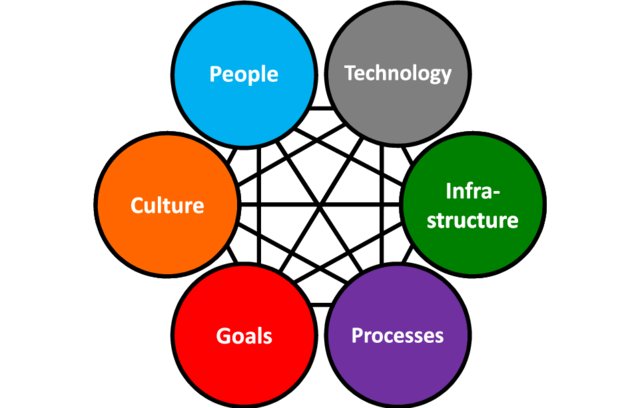Project overview
Complex socio-technical computer systems are too vast and intricate for any human to understand. In a large airport, or a global social networking app, or many other modern system there is a lot more than just technology involved:

Each of these influences are constantly changing, and are complex systems in their own right. How can anyone predict if such a system can be trusted, or what its effects could be on our daily lives? Society is rightly concerned, and Spyderisk is our response to this concern.
Our aim is to revolutionise the understanding of the trustworthiness of socio-technical systems, by establishing an international Open Community supporting the research, development, use and support of open, effective, and accessible risk assessment methods, knowledge and tools.
The Spyderisk Open Project started in 2023, building on 15 years of history in risk assessment.
All our work is published and maintained under open licenses - software source code, ontologies, domain model database, online training, documentation, and academic papers. The Spyderisk Open Project was founded by the University of Southampton in England, but we welcome all collaborators and contributors.
You can contact us via the spyderisk-devlist.
Who is Spyderisk for?
Spyderisk is for people who are familiar with the field of risk assessment, such as risk researchers, academics, ethicists or policymakers.
The Spyderisk Open Project focusses on:
- the ethics of risk assessment
- ontologies of harm, risk and misbehaviour
- mathematical modelling of risk assessment
- software tools to calculate risk in models of complex systems
While the Spyderisk software requires some technical knowledge to operate, our guide for contributors to the Spyderisk System Modeller emphasizes that anyone with a passion for risk assessment can get involved. The ability to explain risk assessment is a valuable skill, and if you possess this ability, we would love to hear from you.
Our introductory online course Cybersecurity Risk Assessment & Modelling: Core Priniciples, is a good place to start for those who are not already in the field of risk assessment.
What is Spyderisk?
Spyderisk is for assessing risk in complex socio-technical systems.
By complex systems we mean "systems of systems that humans are unable to fully understand, debug or predict, typically socio-technical-physical systems." In other words, humans build critical systems that are unknowable, and so we need to apply mathematics to delineate the risks in these unknowable systems.
"Socio-technical" relates to the interconnectedness of the modern world. Social aspects include legal and policy requirements and aspects of human psychology while technical components include information technology networks and machine learning/artificial intelligence. This also includes physical systems such as handheld devices, train station information zones, and human guards at country frontier checkpoints.
Put together, these kinds of complex systems decide our everyday privacy, the safety of our medical records, and that airports function smoothly and safely.
The Spyderisk team has written many papers and reports related to risk assessment, including some of the first on ontological approaches to concepts such as biomedical burden and cybersecurity aspects of systems composed of IoT systems. Spyderisk starts from an ontological approach although end users of the Spyderisk software do not require an understanding of ontology.
As of Mid-2024, the Spyderisk software is in early release, fully available but only working in quite specific circumstances. The course Getting Hands on with Spyderisk, explains how to model systems using the Spyderisk software, and You can get a feel for what the software can do once it is running.
If you are a researcher in the area of risk modelling including ontologies of risk, or if you have a specific problem domain you need to examine (particularly in cybersecurity or privacy) then you are already part of our community and Spyderisk could be for you.
The Spyderisk GitHub repositories
The main four repositories are:
- Spyderisk System Modeller, the web service software, for people comfortable dealing with computer source code
- Spyderisk System Modeller Deployment, the tools which allow a user familiar with installing software to get Spyderisk running, either on their own laptop or on cloud servers they own
- Spyderisk Adaptor, for users of the Python programming language commonly used in science and academia, who want to do automated risk assessment using the Spyderisk reasoner but from their own code. A running instance of the Spyderisk application has APIs that the Spyderisk Adaptor calls
- Spyderisk Domain Network, the most complete and advanced Spyderisk knowledgebase, describing a complex computing/IoT/cloud network in very general terms such as "server computer" or "database". Users of the Spyderisk software can then load in this model and use it as a palette for drawing their own real-world network in order to explore their particular risk profiles
Other repositories vary from project administration tools to very specific technical code that operates on Domain Models.
We look forward to seeing you around the risk assessment community.
Spyderisk Research Projects
- EU DS2: Trusted data exchange across sectors
- EU FAITH: Fostering Artificial Intelligence Trust for Humans towards the optimization of trustworthiness through large-scale pilots in critical domains
- EU NEMECYS: New Medical CyberSecurity and Design Solutions
- NIHR SBRC: Southampton Biomedical Research Centre
- MRC RBEM: Rule-Based Epidemic Modelling
- EU SYNTHEMA: Synthetic hematological data over federated computing networks
- EU THEMIS: Human-centered Trustworthiness Optimisation in Hybrid Decision Support


